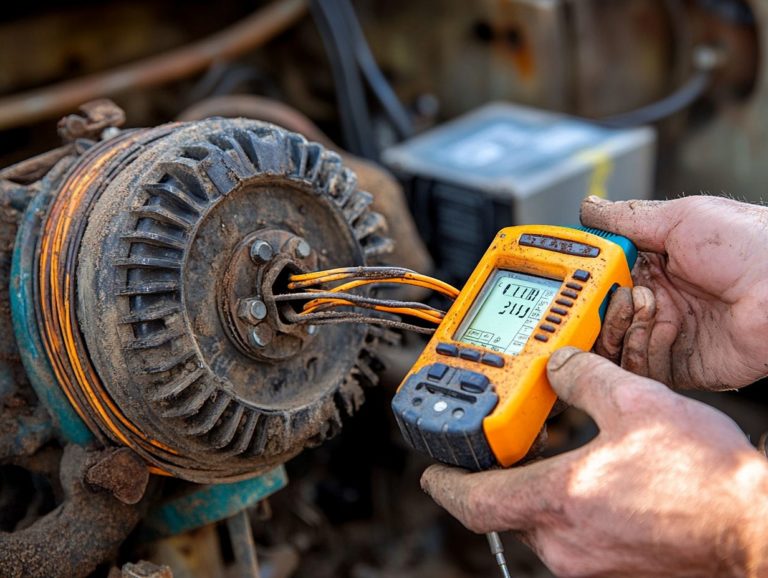How to Know When to Change Your Spark Plugs?
Spark plugs may appear small, yet they hold an important role in your vehicle’s overall performance. Understanding their function and significance allows you to identify when it’s time for a replacement.
Get ready to discover the signs that your spark plugs need changing! This guide will cover common warning signs, how to select appropriate replacements, and a straightforward step-by-step process for changing them yourself. You’ll also find essential maintenance tips to keep your spark plugs in optimal condition and answers to frequently asked questions.
Dive into this guide to ensure your engine runs smoothly and efficiently!
Contents
- Key Takeaways:
- Understanding Spark Plugs
- Signs That Your Spark Plugs Need to Be Changed
- Finding the Right Replacement Spark Plugs
- How to Change Your Spark Plugs
- Maintenance Tips for Spark Plugs
- Frequently Asked Questions about Spark Plugs
- Frequently Asked Questions
- How do I know when to change my spark plugs?
- Can I visually inspect my spark plugs to determine if they need to be changed?
- How often should I change my spark plugs?
- What are the consequences of not changing my spark plugs regularly?
- Can I change my spark plugs myself?
- How long does it take to change spark plugs?
Key Takeaways:

- Regularly check for common warning signs, such as difficulty starting your car, decreased gas mileage, and misfiring, to know when to change your spark plugs.
- Consider factors like the type of spark plug, your car’s make and model, and manufacturer recommendations when replacing your spark plugs for optimal performance.
- Maintain your spark plugs by keeping them clean, checking and replacing them at recommended intervals, and using high-quality fuel to ensure they last longer and keep your car running smoothly.
Understanding Spark Plugs
Spark plugs are vital components of an engine, serving as the ignition source for the fuel-air mixture within the engine chamber. They play a crucial role in achieving efficient engine performance by generating an electrical arc that ignites this mixture.
This ignition triggers the movement of the piston and the rotation of the crankshaft, enabling the engine to perform its essential functions. In vehicles such as the Toyota Corolla and Toyota Sienna, investing in quality spark plugs is key to ensuring optimal operation and longevity.
Function and Importance
Spark plugs are essential in the burning process, as they ignite the fuel-air mixture crucial for optimal engine performance. This ignition starts a controlled explosion within the engine chamber, driving the piston downward and generating the power necessary to propel your vehicle.
The efficiency of your spark plugs directly influences fuel economy; well-functioning spark plugs help burn fuel efficiently, minimizing wasted fuel and enhancing your overall mileage.
You ll find several types of spark plugs available:
- Copper
- Platinum
- Iridium
Each type offers distinct advantages. For example, iridium spark plugs stand out for their superior durability and ignitability, resulting in smoother engine performance and reduced emissions. Choosing the right type of spark plug can significantly enhance ignition effectiveness and contribute to extending your engine’s lifespan.
Signs That Your Spark Plugs Need to Be Changed
Recognizing the signs that your spark plugs need replacement is essential for ensuring your vehicle performs at its best and sidestepping expensive engine issues. Look out for these common indicators:
- Check engine light
- Rough idling
- Engine misfires
- Drop in fuel economy
- Sluggish acceleration
- Difficulty starting your engine
If you notice any of these signs, check your spark plugs today!
Common Warning Signs
Other warning signs of failing spark plugs include noticeable engine noise, increased vibrations, and issues related to faulty oxygen sensors all of which may indicate that your spark plugs are on the fritz.
These symptoms might also reflect deeper issues within your engine’s burning process or the fuel delivery system. For example, irregular engine noise could stem from incomplete combustion, while heightened vibrations often signal that your engine isn’t running smoothly.
Faulty oxygen sensors, which measure the air-fuel mixture, can lead to poor fuel economy and increased emissions, complicating your vehicle’s performance even further. Addressing these warning signs promptly helps facilitate a comprehensive vehicle diagnosis, allowing necessary inspections and preventative measures to be taken.
This helps keep your vehicle running longer and more efficiently.
Take charge of your vehicle’s performance check your spark plugs now!
Finding the Right Replacement Spark Plugs

Finding the right replacement spark plugs is crucial for ensuring your vehicle runs at its best. Several factors come into play when selecting high-quality spark plugs tailored to your vehicle’s needs.
Consider compatibility with your engine type, the materials used in the spark plugs, and the recommended service intervals for replacement. Each of these elements is important for improving your vehicle’s performance and longevity.
Factors to Consider
When selecting spark plugs, consider factors like spark plug life, compatibility with your ignition coil, and how they fit into your overall vehicle maintenance schedule.
The type of ignition coil in your vehicle plays a significant role in spark plug performance. A well-matched coil ensures optimal voltage delivery, fostering more efficient combustion. If your ignition coil isn t compatible, you might experience issues like misfires or poor fuel economy. This can negatively impact the lifespan of your spark plugs.
Regular vehicle maintenance appointments are essential. They not only allow you to check the integrity of your spark plugs but also enable an inspection of the ignition coil and related components. Neglecting these checks can lead to decreased engine performance and potentially costly repairs down the line.
How to Change Your Spark Plugs
Changing your spark plugs is a straightforward vehicle maintenance task that can significantly enhance your engine’s performance. By following a step-by-step guide, you can ensure the process is executed flawlessly.
Begin by gathering the necessary tools and reviewing your vehicle manual for specific instructions tailored to your make and model. This preparation sets you up for success, allowing you to tackle the task with confidence and precision.
Step-by-Step Guide
This step-by-step guide will take you through the spark plug replacement process, especially if you’re facing challenges such as a check engine light or hard starting.
Proper maintenance of spark plugs is vital for ensuring your engine performs at its best. Start by thoroughly inspecting the condition of the old spark plugs; this will provide valuable insights into the overall health of your engine. If you observe excessive wear or deposits, it’s clear that the plugs require immediate replacement to prevent further complications.
Next, make sure the new spark plugs are gapped correctly. This means ensuring there is the right amount of space between the spark plug’s electrodes according to the manufacturer s specifications. Improper gaps can lead to misfiring or reduced fuel efficiency. When reinstalling the plugs, do so with care, ensuring they are securely fastened but not overtightened.
By addressing any issues promptly, you can sidestep more costly repairs down the road and keep your engine running smoothly.
Maintenance Tips for Spark Plugs
Maintaining your spark plugs in excellent condition is crucial for ensuring your engine performs at its best over the long haul. You can easily achieve this by scheduling regular maintenance appointments!
By routinely checking and cleaning your spark plugs, you can significantly extend their lifespan and boost your engine’s efficiency.
Keeping Your Spark Plugs in Good Condition

To keep your spark plugs in top shape and extend their lifespan, choose high-quality spark plugs for your vehicle maintenance routine. Choosing the right spark plugs can dramatically enhance your engine’s performance and longevity, ensuring a smooth ride and optimal fuel efficiency.
Regularly monitoring your engine s performance will give you valuable insights into when these components may need attention. For example, if you start experiencing rough idling, declining fuel efficiency, or trouble starting your vehicle, it might be time to inspect or replace those spark plugs.
Following a maintenance schedule, typically outlined in your vehicle’s manual, will help you maximize performance and catch potential issues before they escalate. This proactive approach enhances your driving experience and helps you avoid costly repairs down the road.
So, check your spark plugs soon or schedule a maintenance appointment today to keep your vehicle in top shape!
Frequently Asked Questions about Spark Plugs
Understanding spark plugs leads to many common questions, especially regarding their importance in vehicle inspections and engine problem diagnosis.
Common Queries and Answers
Questions about spark plugs often focus on their effect on engine performance and the best time for replacement based on signs of wear.
These components play a vital role in your vehicle’s longevity and efficiency. Spark plugs are the first step in your ignition system; they ignite the air-fuel mixture inside the engine’s cylinders. When they wear out, you might notice reduced fuel efficiency, rough idling, or difficulties in getting your engine to start.
Spotting signs of worn spark plugs can save you money and keep your engine running smoothly. Regular inspections and timely replacements are essential for smooth vehicle operation, ultimately enhancing your driving experience.
Frequently Asked Questions
How do I know when to change my spark plugs?
Look for signs like difficulty starting your engine, rough idling, decreased fuel efficiency, and noticeable drops in engine performance.
Can I visually inspect my spark plugs to determine if they need to be changed?
Yes, you can. If your spark plugs are coated with a thick layer of dark deposits or the electrode tip appears worn down, they likely need replacement.
How often should I change my spark plugs?
The general rule is to replace your spark plugs every 30,000 miles. However, it’s best to refer to your vehicle’s owner’s manual for the manufacturer’s recommended interval.
What are the consequences of not changing my spark plugs regularly?
Failing to change your spark plugs can lead to reduced engine performance, starting issues, and potential damage to your catalytic converter, which helps cut down on harmful emissions.
Can I change my spark plugs myself?
If you have basic automotive knowledge and the right tools, you can change your spark plugs. If you’re unsure or uncomfortable, it’s safer to consult a mechanic.
How long does it take to change spark plugs?
The time required varies by vehicle make and model, but it usually takes less than an hour. It’s wise to set aside extra time in case any challenges arise.
Don t wait until it s too late! Check your spark plugs today to ensure your vehicle runs at its best.







